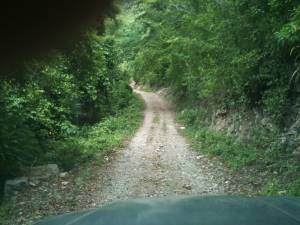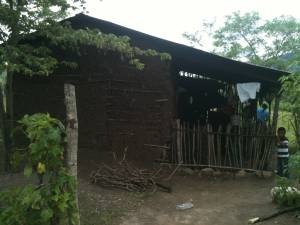A letter from Tim Wheeler in the U.S., ending service in Honduras
January 2016
Dear Friends,
We often speak of sustainable development but rarely of sustainable mission.
Gloria and I left Honduras in August 2015. Since then we’ve been reflecting on 40 years of mission service, 25 of them as PC(USA) mission co-workers. Two texts have offered us wonderful core values for mission. Luke 4:18 proclaims: “The Spirit of the Lord is upon me, because he hath anointed me to preach the gospel to the poor; he hath sent me to heal the brokenhearted, to preach deliverance to the captives and recovering of sight to the blind, to set at liberty them that are bruised.” In Matthew, Jesus continues: Blessed are the poor, those that mourn, the meek, those that hunger and thirst after righteousness, the merciful, the pure in heart, the peacemakers, the persecuted.
We’ve seen God’s healing hand so many times and in so many ways. We’ve sensed a new way of it being demonstrated by improved relationships and community involvement. We’ve seen how healing and comforting power has transformed the lives of the forgotten and marginalized. We shared experiences with amazing people who might be dismissed as unimportant, failures or outcasts. They have shown us that God is active in this world and real change is possible. But what about sustainable mission? Will things continue now that we have left?
Rev. Dr. Phil Butin was visiting us once with a mission team. He noted that when someone else could accomplish a task in the community or with the team, we stepped back. He noted that, by letting others lead, we empowered them.
 One friend Eluterio comes to mind. Through his gentle, shared leadership he can motivate a whole community. Eluterio is from the Maya Chorti ethnic group and lives in Chonco. His community used to be part of Guatemala. When the border was redrawn, Chonco became part of Honduras. The community was owned by one large landowner; the residents had no land and no rights. Under this feudal system people gave part of their crops to the landowner. Community leaders organized through a series of secret meetings. They finally won the right to their land under a government decree in the 1990s. The land was rocky and hilly, but there they built their community. Eventually they started a housing project under Gloria’s supervision and with the presence of mission teams from the United States. (Yes, short-term mission teams can contribute to social change!)
One friend Eluterio comes to mind. Through his gentle, shared leadership he can motivate a whole community. Eluterio is from the Maya Chorti ethnic group and lives in Chonco. His community used to be part of Guatemala. When the border was redrawn, Chonco became part of Honduras. The community was owned by one large landowner; the residents had no land and no rights. Under this feudal system people gave part of their crops to the landowner. Community leaders organized through a series of secret meetings. They finally won the right to their land under a government decree in the 1990s. The land was rocky and hilly, but there they built their community. Eventually they started a housing project under Gloria’s supervision and with the presence of mission teams from the United States. (Yes, short-term mission teams can contribute to social change!)
Eluterio was part of the first generation of young people to go to school. People trusted him; he became the coordinator for the housing project. They made blocks by hand down by the river and hauled them up the hill. To get materials to the village, they built a road along the river. When Gloria asked whether they were up to the task, Eluterio replied in his soft voice: “Just try us. You don’t know us yet, we will build it.” Forty men and boys chipped away rock every day for two months until it was done.

New house built in 2015 by group fo young people
Building the houses was easier. They knew what they wanted and they learned the skills needed. Their previous houses, made of sticks and thatched roofs, had led to a high incidence of the life-shortening Chagas disease. The community’s vision for the future and Eluterio leadership of the process impressed us.
A few years later this same drive for community improvement led to a school project. Again the community provided labor, accompanied by visiting mission teams. They built a three-room school with a library. Again local authorities did not contribute to the cause. The community lobbied—under Eluterio’s direction—to get electricity to the village. With this lobbying effort the community demonstrated that they had an effective voice that could bring about sustainable change.
Last January we invited Eluterio to talk to a visiting mission team about his community’s experience and the challenges they have faced as indigenous people. He walked the 10 km into town to visit with the group. As he told his story, it became clear that they were planning a new project—to plaster the walls of their houses. A week or so later the group contacted me offering to give a donation for this project. When Eluterio was informed of the donation, he said that the village preferred to channel the gift to eight young families that wanted to build their own houses just as their parents had before. Eluterio promised to mentor the project. We were deeply moved at how the community chose to channel the gift to those with the greatest need. By July the community had built the eight houses, this time without the assistance of mission teams.
During our last month in Honduras a proposal for a new housing project came in from a nearby village, El Rincon del Buey. We were scheduled to leave; traditional wisdom suggested that things would just stop. But we learned a long time ago that it is not our place to set limitations on the dreams of others by saying, “No, this can’t be done.” Eluterio agreed to coordinate this new project in the nearby village. They were also indigenous people, and we thought he would be the perfect mentor and organizer. Now the project is under way; Eluterio rides his bicycle to the village twice a week to meet with the people and coordinate activities. A mission team is going to work with them next month. The team will undoubtedly assist and encourage them in many ways, but the initiative is coming from the people themselves to change their own lives.
Today we spoke with Eluterio on the phone. He told us that they are working together to make their latest dream a reality: building a church.
Making mission sustainable is not easy. You need leadership, organization, an attitude of service, a clear process with shared leadership, gender equity, a cooperative spirit open to learning and funding. Funding resources can include the community itself, local governments, NGOs and, when possible, mission teams. Community projects become a school that trains leaders to become teachers and mentors who then can continue to carry out God’s plan in surrounding communities.
Mission can become sustainable! We lift up Eluterio and many others with whom we had the privilege of working. Thank you for being part of our support family for so many years. This story is also your story. For that we are deeply grateful. If you would like more information about sustainable mission, please get in touch with us.
For now we are in Pennsylvania closer to our family and delighting in our new granddaughter.
Yours faithfully,
Tim and Gloria Wheeler
2954 Pinch Road
Manheim, PA 17545
P.S. One way World Mission will sustain the mission and partnership developed in Honduras is through a new mission co-worker, who will help the Presbyterian Church of Honduras organize training opportunities and increase access to culturally appropriate educational resources. Honduran Presbyterian leaders would also like for the mission co-worker to help organize its ministries and facilitate partnerships between Honduran and the U.S, including with the PC(USA)’s Honduras Mission Network, a group promoting relationship building and information sharing among people involved in mission in Honduras. With your prayer and financial support, this urgently needed position can be filled.
![]() You may freely reuse and distribute this article in its entirety for non-commercial purposes in any medium. Please include author attribution, photography credits, and a link to the original article. This work is licensed under a Creative Commons Attribution-NonCommercial-NoDeratives 4.0 International License.
You may freely reuse and distribute this article in its entirety for non-commercial purposes in any medium. Please include author attribution, photography credits, and a link to the original article. This work is licensed under a Creative Commons Attribution-NonCommercial-NoDeratives 4.0 International License.